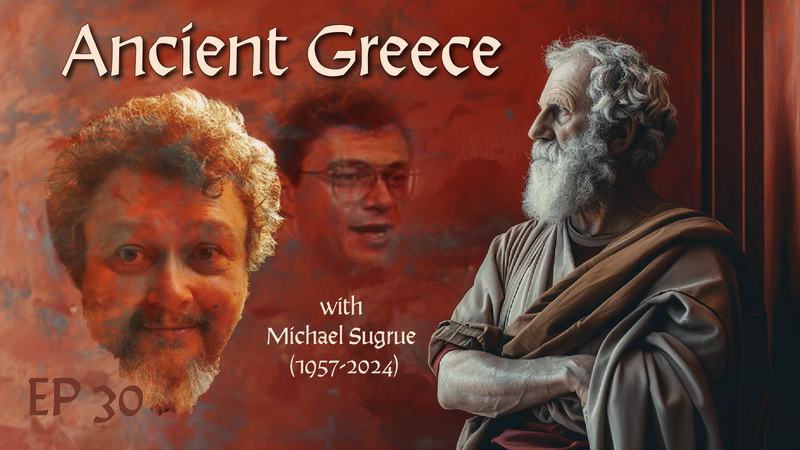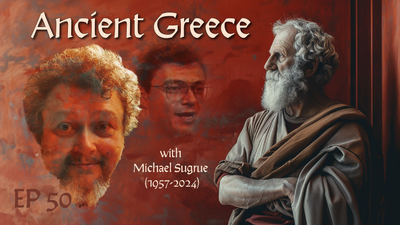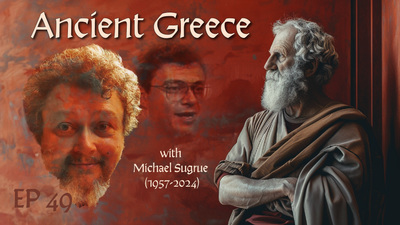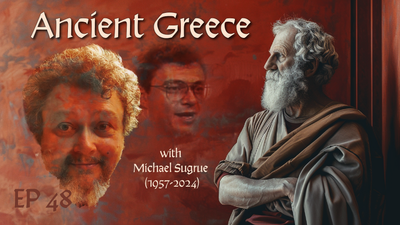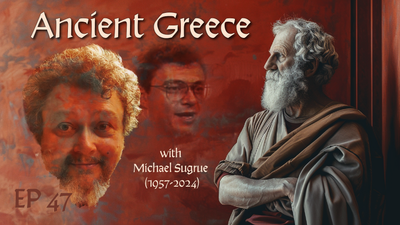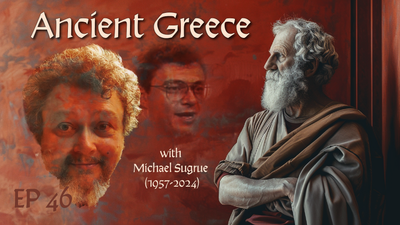In Plato’s view, life’s greatest challenge is achieving a balanced soul—one in which reason and emotion operate harmoniously, supporting our pursuit of virtue. This week's theme takes us to Plato’s Republic, where he examines the soul's complexity, suggesting that a delicate equilibrium of rational thought and spirited emotion shapes an individual’s character. Plato believed that reason must be a guiding force, reining in emotional impulses, much like a charioteer managing powerful, spirited horses. Imagine if our modern struggles—stress, work-life balance, even digital distractions—could be navigated by applying Plato’s principles of balance and harmony.
Plato’s teachings on balance are remarkably relevant today, especially as we manage emotional challenges and decisions in our personal and professional lives. For instance, consider how we often need to temper anger or frustration with patience and reason, especially in situations where reacting impulsively could harm our relationships or work environments. In Republic (440e-441c), Plato describes how the spirited part of the soul, when aligned with reason, fuels our courage and resilience, while uncontrolled, it can lead to rash or destructive actions. This age-old insight reminds us that true strength lies not in emotional suppression but in harnessing our emotions to serve reason, allowing us to respond rather than react.
To keep exploring the relevance of these ancient insights, you’re invited to join the discussions on planksip.org, where the personification of Plato becomes an ideal to strive for. There, we’ll engage in imagining how Plato might view our modern world and address its unique challenges with his timeless wisdom. This week, let’s reflect on our own balance between reason and emotion and consider how a little philosophical insight could transform our daily lives.
From the Archives of Ancient Greece: Featuring Dr. Michael Sugrue
Dr. Michael Sugrue provides a fresh perspective on how Plato views reason as a stabilizing force in the soul, counteracting the volatility of emotions. Dr. Sugrue’s work with The Republic illustrates Plato’s view that a well-ordered soul resembles a harmonious city-state, where each part—reason, spirit, and desire—fulfills its unique role. Plato was convinced that emotional upheavals weaken our ability to live virtuously unless managed by reason, a concept that could be transformative if applied to the stress-filled, often polarized conversations that dominate today’s social and political landscapes.
Imagine the impact if our modern “city of the soul” operated as Plato describes. In the workplace, for instance, managing difficult conversations with a blend of empathy and rationality might avoid unnecessary conflict and build stronger teams. This concept is particularly relevant in leadership, where reason must guide emotional intelligence to inspire and connect with others effectively. Sugrue notes that Plato’s insight extends beyond mere self-control; it’s about fostering a dynamic where reason empowers spirit and desire rather than suppressing them—a partnership within the soul that echoes through the best of our cultural, political, and personal decisions.
Dr. Sugrue’s reflections prompt us to reconsider how this balance might play out in everyday life. If reason were to act as the ‘charioteer’ of our emotions, guiding us through stress, anger, or even joy, we could experience a more resilient, harmonious existence. Join the conversation on planksip.org, where Dr. Sugrue’s insights serve as a foundation for imagining a modern, balanced soul and the virtues that spring from it.
Insights from the Dialogues: Quoting Plato
In The Republic (440e-441c), Plato describes the soul as a composite of reason, spirit, and appetite, likening it to a charioteer controlling two horses—one that represents noble, spirited traits and another that embodies base desires. This metaphor brings to mind a vivid image of our internal struggles: moments when reason pulls one way, while our emotions pull us toward an entirely different direction. Imagine a moment of frustration when we want to act out impulsively, yet something within us—the charioteer of reason—guides us toward patience or forgiveness. Plato’s charioteer serves as a symbol of wisdom, showing us that while emotions are necessary, they need guidance to serve our highest ideals.
In daily life, think of a scenario where patience pays off, perhaps in a tense family discussion or a challenging project. Reason, in Plato’s terms, is not merely a brake on passion; it is what ensures that our spirited pursuits—courage, ambition, or passion—are channeled constructively. The challenge lies not in eliminating our emotions but in understanding them and aligning them with our higher goals. A soul in balance, Plato suggests, lives a life of genuine harmony, where every part works in concert with the others, much like an orchestra playing a well-arranged symphony.
The beauty of this balanced soul is its practicality—it’s an attainable ideal we can strive for in small steps each day. On planksip.org, we’re building a community inspired by Plato’s ideals, where these dialogues become a foundation for real-world applications. Join us as we explore ways to make the charioteer’s wisdom a part of our modern lives, imagining Plato’s vision as a daily practice in our relationships, work, and personal growth.
Chance and Fate: Balancing Emotion and Reason in Ancient Rituals
In ancient Greece, rituals and games often symbolized the delicate interplay between fate and self-control, teaching that fortune alone could not dictate success. Games of knucklebones (astragali), for example, were as much about luck as they were about strategy. Players balanced chance with intentionality, making every roll of the bones a moment of reckoning between fortune and skill. This practice reinforced a societal belief in self-control even in the face of life’s uncertainties—a value that aligns seamlessly with Plato’s teachings on balancing reason and emotion.
Explore the Mystical World of Astraguli: Ancient Games of Chance with Cultural Significance.
These games served as a microcosm of life’s unpredictability, reminding players that while we may not control our circumstances, we can control our reactions. Think of a competitive board game today, where emotions run high, yet a winning strategy requires patience and foresight. Plato would argue that games like these are not mere entertainment; they are practice grounds for the balanced soul, training us to respond thoughtfully rather than impulsively.
For those inspired by this metaphor, join planksip.org, where we’re exploring how ancient games and rituals provide insight into Plato’s philosophy. In our discussions, we delve into the ways that chance and reason interplay in our lives and examine how these ancient lessons can inform our responses to life’s twists and turns.
Virtues Revisited: Practical Lessons for Today
This week’s virtue, Temperance, epitomizes the wisdom of balancing passion with reason, a practice that seems more vital than ever in our fast-paced, information-saturated world. Temperance requires us to cultivate restraint and focus, channeling our desires and emotional drives toward positive ends. For instance, consider how temperance applies in managing our online presence: posting mindfully, setting boundaries around screen time, and resisting the urge to engage in every debate. Plato’s view is clear: a temperate person lives free from the tyranny of unrestrained desires, finding joy in moderation and purposeful actions.
In our relationships, temperance fosters genuine connections. Instead of acting on every fleeting feeling, temperance allows us to listen actively, respond thoughtfully, and build trust over time. In this way, temperance is not about denying our emotions but about using them wisely—aligning with Plato’s idea that true freedom arises when reason guides passion. Such discipline doesn’t just lead to individual peace; it builds a community of people who act from a place of shared virtue.
You’re invited to discuss these insights on planksip.org, where we explore the virtues that Plato championed and apply them to modern challenges. Join our community in imagining a world where temperance isn’t just a personal practice but a cultural value that shapes how we live, work, and connect with others.
Engage with Us: Reader’s Corner
What does balancing reason and emotion look like in your life? Have you found ways to temper your responses, even when emotions run high? Share your reflections on planksip.org, where selected responses will be featured in our next edition. Together, we’re building a modern community rooted in ancient wisdom, and we invite you to be part of this journey. This is a space where we explore Plato’s ideals not as relics of the past but as practical guides for living well today.
Closing Reflection: Socrates’ Enduring Legacy
Plato’s portrayal of the balanced soul, inspired by his teacher Socrates, is more than a philosophical concept; it’s a call to self-mastery, resilience, and empathy. Socrates famously said, “The unexamined life is not worth living,” underscoring his belief in the transformative power of self-reflection. As we navigate the complexities of modern life, this ancient wisdom invites us to look within, to cultivate a soul where reason and emotion work in harmony, strengthening our character and guiding us toward a life of purpose.
As you reflect on this week’s theme, consider how a balance of reason and emotion might transform your own life. Join us on planksip.org, where Socrates’ legacy is alive in each of us, as we continue the journey toward understanding, virtue, and the good life. Let’s imagine together how the ideals of ancient Greece can inspire us to meet today’s challenges with wisdom and grace.

Plato Re-Imagined
This course offers 32 comprehensive lectures exploring most of Plato's dialogues. These lectures guide students toward a consilient understanding of the divine—a concept that harmonizes knowledge across disciplines and resonates with secular and religious leaders. As a bonus, Lecture #33 focuses on consilience, demonstrating how different fields of knowledge can converge to form a unified understanding.

